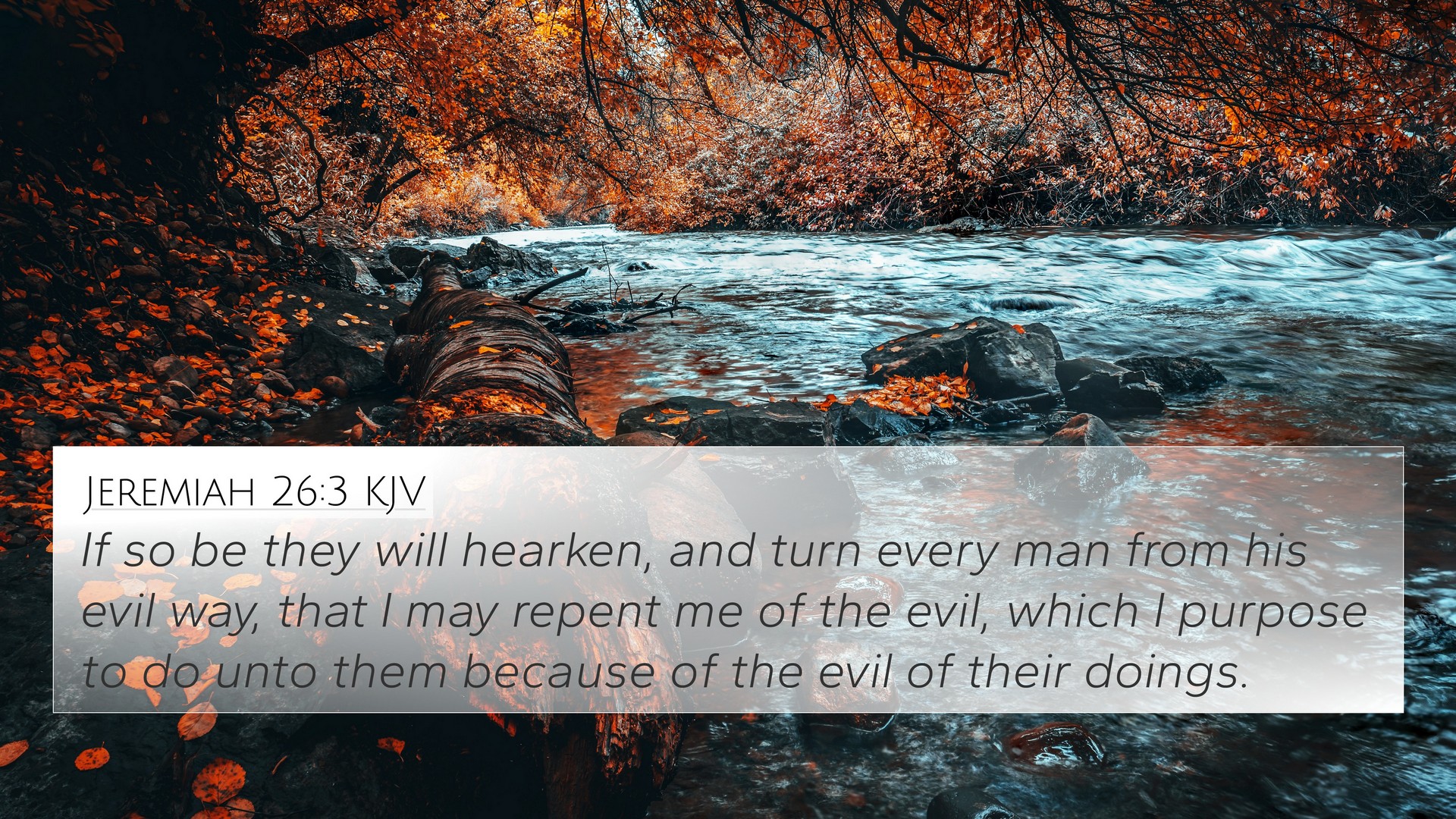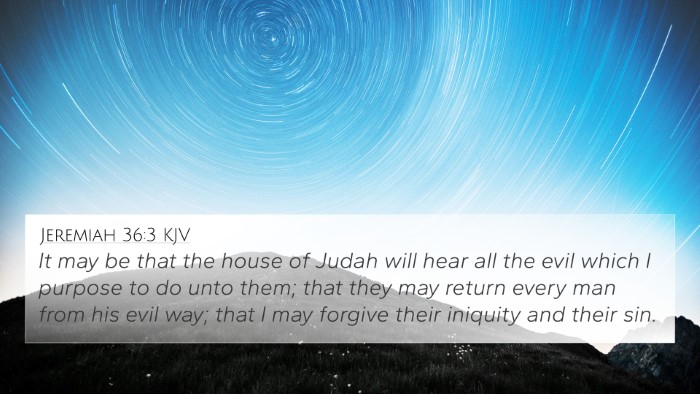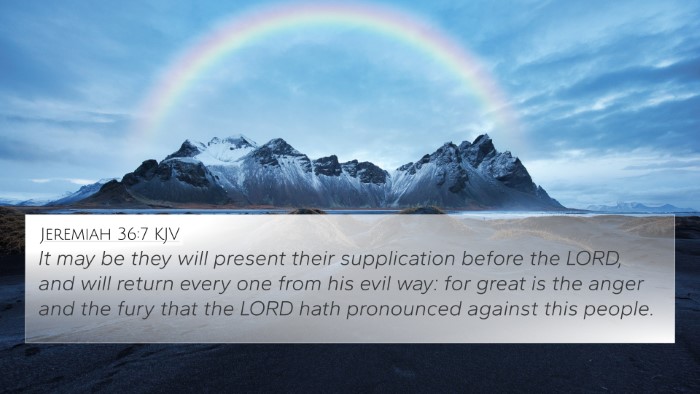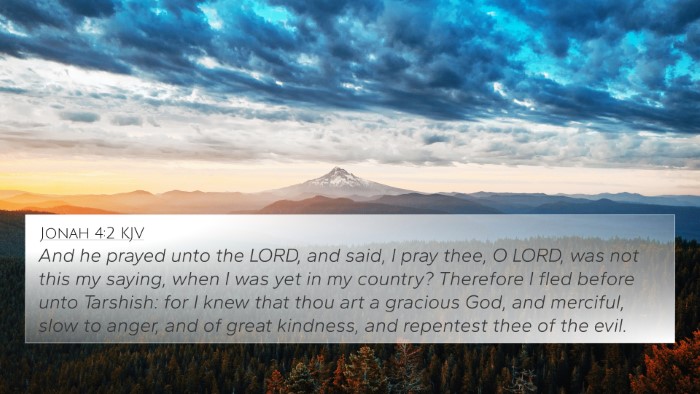Understanding Jeremiah 26:3
Verse: “If so be they will hearken, and turn every man from his evil way, that I may repent me of the evil, which I purpose to do unto them because of the evil of their doings.” (Jeremiah 26:3)
This verse presents a divine call for repentance, where God expresses the conditional nature of His mercy in response to the behaviors of His people. The prophet Jeremiah conveys God's message, highlighting the importance of listening, turning from wickedness, and the impact of these actions on the divine decision to either bring judgment or extend mercy.
Summary of Biblical Meaning
The primary interpretation revolves around the theme of repentance. God desires for His people to return from their sinful ways so that He may retract the judgment aligned with their actions. This reflects God's willingness to forgive and His hope for restoration rather than destruction.
Commentary Insights
- Matthew Henry's Commentary: Henry emphasizes the necessity of a heartfelt change in actions. He notes that the condition set forth by God in this scripture is not mere outward compliance but genuine contrition and a transformative response to God's warnings.
- Albert Barnes' Commentary: Barnes draws attention to the nature of God's character, showing how His desire is not to punish but to lead to repentance, indicating that divine leniency follows sincere efforts to mend life's course.
- Adam Clarke's Commentary: Clarke explores the eventual outcome of repentance, underscoring that God delights in mercy. He frames this verse within the broader narrative of God’s longing for reconciliation with humanity.
Connections Between Bible Verses
Jeremiah 26:3 finds strong thematic connections with several other verses that highlight God's mercy, the necessity of repentance, and His conditional promises. Here are some notable cross-references:
- 2 Chronicles 7:14: "If my people, which are called by my name, shall humble themselves, and pray, and seek my face, and turn from their wicked ways; then will I hear from heaven, and will forgive their sin, and will heal their land."
- Ezekiel 18:30: "Therefore I will judge you, O house of Israel, every one according to his ways, saith the Lord God. Repent, and turn yourselves from all your offenses; so sin will not be your downfall."
- Jonah 3:9: "Who can tell if God will turn and repent, and turn away from his fierce anger, that we perish not?"
- Luke 13:3: "I tell you, Nay: but, except ye repent, ye shall all likewise perish."
- Acts 3:19: "Repent ye therefore, and be converted, that your sins may be blotted out, when the times of refreshing shall come from the presence of the Lord."
- Romans 2:4: "Or despisest thou the riches of his goodness and forbearance and longsuffering; not knowing that the goodness of God leadeth thee to repentance?"
- 1 John 1:9: "If we confess our sins, he is faithful and just to forgive us our sins, and to cleanse us from all unrighteousness."
Thematic Bible Verse Connections
This verse also connects with broader scriptural themes of God's justice and mercy. The conditional aspect of divine action against humanity's wrongdoing resonates throughout Scripture:
- God's Desire for Restoration: God wishes to heal rather than to harm, a theme prevalent in both Old and New Testaments.
- Call to Repentance: Continuous calls for change are woven throughout prophetic writings and Gospels.
- Conditional Promises: Many Biblical instances showcase God’s mercy being contingent upon human response.
Comparative Bible Verse Analysis
Jeremiah 26:3 can be compared with 2 Peter 3:9, which emphasizes God's patience, desiring all to attain repentance instead of perishing. This comparative analysis showcases the consistent biblical motive for repentance leading to life.
Cross-Referencing Bible Study Tools
For those embarking on deeper study, cross-referencing tools can illuminate connections, enabling readers to explore God's plan throughout the Bible:
- Bible Concordance: A tool to find occurrences of words and passages that help connect themes.
- Bible Cross-reference Guide: Guides to identify related scriptures for thematic studies.
- Cross-reference Bible Study: Methodologies that utilize various verses together to reveal greater insights.
Suggestions for Personal Study
To gain a comprehensive understanding, consider these methods:
- Identify cross-references using a Bible reference resource.
- Engage in a comparative study of Pauline epistles alongside prophetic texts.
- Analyze the links between the Prophets and New Testament teachings for richer insights.
Conclusion
In conclusion, Jeremiah 26:3 encapsulates the profound invitation to repentance and the accompanying promise of forgiveness. The interconnectedness of this message with other scriptures illustrates the overarching theme of divine mercy and human responsiveness prevailing throughout the biblic narrative.











